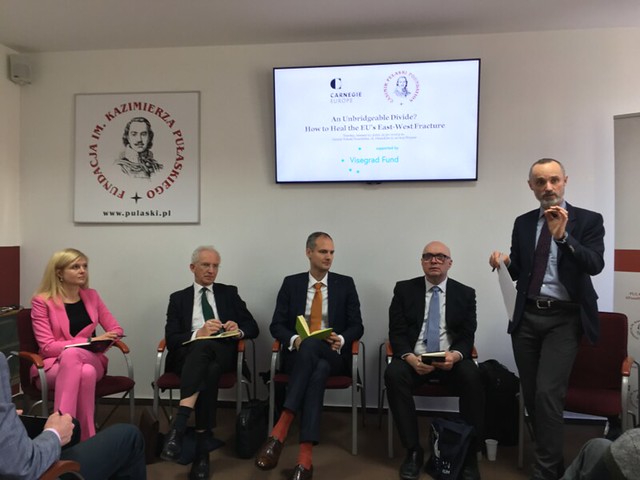Registration
You will receive an email confirming your registration.
Fifteen years after the 2004 enlargement, the European Union still sometimes behaves as two halves rather than a whole. Some see deep differences between the East and the West, but why should they matter more than the North-South divide, or the one between the EU’s big and small member states? To move forward, each party needs to understand better the roots of the discontent.
Carnegie Europe fellows Tomáš Valášek, Pierre Vimont, and Stefan Lehne led a lively discussion featuring experts Jan Macháček, chairman of the Board of Trustees at the Institute for Politics and Society in Prague; Katarzyna Pisarska, program director of the Warsaw Security Forum; and Márton Ugrósdy, director of the Institute for Foreign Affairs and Trade (IFAT) in Budapest.
The discussion kicked off with a brief presentation on a series of action points conceived to bridge the East-West gap and to take the sting out of disagreements – as outlined in Carnegie Europe’s recent publication entitled “Why Can’t the EU’s West and East Work as One?” The discussion was also an occasion to reflect on the proposed solutions and share alternate insights on how the relationship could be strengthened.
A light reception followed.
Tomáš Valášek
Tomáš Valášek is a senior fellow at Carnegie Europe, where his research focuses on security and defense, transatlantic relations, and Europe’s Eastern neighborhood.
Pierre Vimont
Pierre Vimont is a senior fellow at Carnegie Europe. His research focuses on the European Neighborhood Policy, transatlantic relations, and French foreign policy.
Stefan Lehne
Stefan Lehne is a visiting scholar at Carnegie Europe in Brussels, where he researches the post–Lisbon Treaty development of the European Union’s foreign policy with a specific focus on relations between the EU and member states.
Jan Macháček
Jan Macháček is the chairman of the Board of Trustees at the Institute for Politics and Society in Prague.
Katarzyna Pisarska
Katarzyna Pisarskais the program director of the Warsaw Security Forum.
Márton Ugrósdy
Márton Ugrósdy is the director of the Institute for Foreign Affairs and Trade (IFAT) in Budapest.

